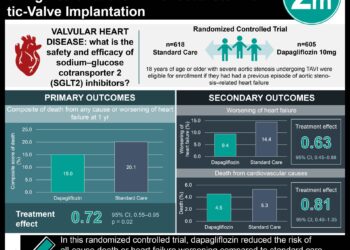Symptomatic and non-symptomatic heart failure associated with increased postoperative mortality in non-cardiac elective surgery
1. In this retrospective cohort study, 90-day postoperative mortality after non-cardiac surgeries was higher for patients with symptomatic or non-symptomatic heart failure than patients without.
2. Postoperative mortality increased with decreasing ejection fraction.
Evidence Rating Level: 2 (Good)
Study Rundown: Heart failure is an important risk factor for postoperative mortality. However, it is not clear if the degree of increased risk is influenced by left ventricular function or the presence of heart failure symptoms. This retrospective cohort study showed patients with heart failure had higher risk of 90-day postoperative mortality than patients without heart failure, regardless of whether they were symptomatic or not. However, being symptomatic carried higher risk. In addition, postoperative mortality increased with decreasing ejection fraction.
Compared to previous studies that have evaluated heart failure and postoperative mortality risk, patients in this study underwent more complicated surgical procedures, were older, and had more medical comorbidities. In addition, this was a VA population, which means they were likely older and predominantly male, and thus generalizability may be reduced. In addition, all patients were cleared for surgery by a physician, and hence, there was a risk of inclusion bias.
Click to read the study in JAMA
Relevant Reading: Cardiac Biomarkers Predict 1-Year Mortality in Elderly Patients Undergoing Hip Fracture Surgery
In-Depth [retrospective cohort]: 609,735 patients were analyzed from 2 national VA databases. Patients were classified as having heart failure if they had at least 1 inpatient admission or at least 2 outpatient clinical visits with a diagnosis of heart failure by an International Classification of Diseases code within 3 years of surgery. The heart failure patients were further subdivided by left ventricular ejection fracture (LVEF) and presence of heart failure signs and symptoms. 47,997 patients (7.9%), had a clinical diagnosis of heart failure. 59.9% of heart failure patients had preserved systolic function (LVEF >=50%). Review of medications suggested optimal medical management for the majority of these heart failure patients. Patients with heart failure underwent more complex procedures than patients without heart failure. The 90-day postoperative mortality risk among heart failure patients was 5.49% vs. 1.22% among patients without heart failure. After multivariable adjustment, the adjusted absolute risk difference was 1.03% (CI95 0.91 to 1.15%). Risk for postoperative mortality increased with decreasing systolic function (p < 0.001). All patients with heart failure, regardless of symptoms or systolic function, had higher risk of postoperative mortality than patients without heart failure. The association between heart failure and postoperative mortality was similar at 30-day and 1-year time points. The crude 90-day postoperative mortality for patients with heart failure increased from 4.62% for standard complexity operations to 10.34% for complex procedures. The adjusted absolute RD between patients with and without heart failure was 1.29% (CI95 1.22 to 1.37%) for standard procedures, 1.69% (CI95 1.48% to 1.94%) for intermediate procedures, and 1.80% (CI95 0.08 to 3.60%) for complex procedures.
Image: PD
©2019 2 Minute Medicine, Inc. All rights reserved. No works may be reproduced without expressed written consent from 2 Minute Medicine, Inc. Inquire about licensing here. No article should be construed as medical advice and is not intended as such by the authors or by 2 Minute Medicine, Inc.







